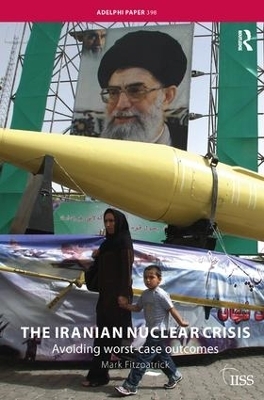
The Iranian Nuclear Crisis
Routledge (Verlag)
978-1-138-43675-6 (ISBN)
This paper explains how Iran developed its nuclear programme to the point where it threatens to achieve a weapons capability within a short time frame, and analyses Western policy responses aimed at forestalling that capability. Key questions are addressed: will the world have to accept an Iranian uranium-enrichment programme, and does having a weapons capability mean having the Bomb?
For nearly two decades, Western strategy on the Iran nuclear issue emphasised denial of supply. Since 2002, there has also been a demand-side dimension to the strategy, aimed at changing Iran‘s cost benefit calculations through inducements and pressure. But the failure of these policies to prevent Iran from coming close to achieving a nuclear-weapons capability has promoted suggestions for fallback strategies that would grant legitimacy to uranium enrichment in Iran in exchange for intrusive inspections and constraints on the programme.
The paper assesses these ‘second-best options in terms of their feasibility and their impact on the proliferation risks of diversion of nuclear material and knowledge, clandestine development and NPT break-out, and the risk of stimulating a proliferation cascade in the Middle East and beyond. It concludes that the risks are still best minimised by reinforcing the binary choice presented to Iran of cooperation or isolation, and strengthening denial of supply.
Mark Fitzpatrick is Senior Fellow for Non-Proliferation at The International Institute for Strategic Studies and Director of its Non-Proliferation and Disarmament Programme. He is the editor and principal author of IISS strategic dossiers on Nuclear Programmes in the Middle East: In the shadow of Iran (London: IISS, 2008) and Nuclear Black Markets: Pakistan, A.Q. Khan and the rise of proliferation networks: A net assessment (London: IISS, 2007). He has published articles on the Iranian and North Korean nuclear programmes and other proliferation topics in Survival, the Financial Times, the International Herald Tribune and other publications, and he is a frequent news commentator and international lecturer on these subjects. He was a US diplomat for 26 years, including as Deputy Assistant Secretary for Non-Proliferation.
Introduction 1. Framing the Problem: Iran,s Pursuit of Fissile Material 2. Western Strategy So Far 3. Can Iran's Capability Be Kept Non-Weaponised? Conclusion
| Erscheinungsdatum | 07.10.2017 |
|---|---|
| Reihe/Serie | Adelphi series |
| Verlagsort | London |
| Sprache | englisch |
| Maße | 156 x 234 mm |
| Gewicht | 453 g |
| Themenwelt | Geschichte ► Teilgebiete der Geschichte ► Militärgeschichte |
| Medizin / Pharmazie ► Medizinische Fachgebiete ► Dermatologie | |
| Sozialwissenschaften ► Politik / Verwaltung | |
| Sozialwissenschaften ► Soziologie ► Spezielle Soziologien | |
| ISBN-10 | 1-138-43675-5 / 1138436755 |
| ISBN-13 | 978-1-138-43675-6 / 9781138436756 |
| Zustand | Neuware |
| Haben Sie eine Frage zum Produkt? |
aus dem Bereich


